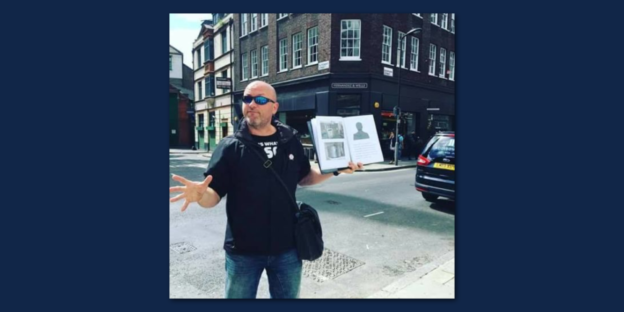Luke reads extracts from The War of the Worlds by H.G. Wells. This is a classic bit of science fiction writing from the Victorian era, with some thrilling passages and scary descriptions. It’s one of my favourite books of all time and I hope you enjoy it too and learn some English from it. Full transcript available and YouTube version too.
Audio Version
Video Version
Click here for part 2
Click here for part 3
Full Episode Transcript (starts after the jingle)
Hello listeners,
It’s story time in this episode because I’m going to tell you a classic English science fiction story.
The story is called War of the Worlds by H.G. Wells the classic storyteller who also wrote The Invisible Man and The Time Machine, and you have probably heard of War Of The Worlds because it is definitely one of the most famous and most influential science fiction stories ever written.
Now, I know that science fiction is not everyone’s cup of tea, but I do hope you stick around and listen to this story because I think this is just particularly good writing and the story is very exciting, immersive and memorable so it should be a really enjoyable way to pick up some more English.
I won’t be reading the whole book of course but I will be reading some selected extracts and giving you a summary of the key details in the first part of the story.
The aims of this episode
To entertain you with a really engaging story in English.
Stories are a great way to get more English into your head and if they are exciting and immersive, then that’s even better.
To show you a slightly old-fashioned version of English, which is really rich in descriptive language and more formal in style than today’s English.
It’s good to be exposed to diverse versions of the language.
Old fashioned English is much more like modern formal English, so it’s a good lesson in style.
This can really strengthen your English in various ways.
To help you notice some nice bits of vocabulary along the way.
Having a broad range of vocabulary is essential in achieving truly advanced English. This story is very rich in descriptive language.
To inspire you perhaps to read the rest of the book.
Reading is such an important thing to do for your English, and maybe you’re looking for interesting books to read. You could consider this one. It’s not too long.
This is also available as a video episode on YouTube and if you watch you can see me recording the podcast with the text on the screen next to my face. So you can listen and read at the same time and see me telling the story.
You can read the entire text I am reading from on the page for this episode at teacherluke.co.uk.
Context of the story and the writing style
War of the Worlds has been adapted lots of times – in films (most famously the 2005 Stephen Spielberg film with Tom Cruise – which you might have seen) and another film version in the 1950s set in Los Angeles, an audiobook musical version read by Richard Burton and an infamous dramatised radio series by Orson Welles.
This is the original alien invasion story. This book was one of the very first stories to ever explore these themes and to describe these kinds of things in such a realistic way.
This is the one that has inspired so many others and in my opinion, none of the other versions of this story or copies of this story can compare to this original version from 1897.
The writing is very realistic and journalistic in style, written from the first person perspective of a guy just experiencing the events as they happened and describing everything in great detail.
A note about the language and the writing style
The language is pretty old fashioned (1897) but it’s really well written and it should be interesting for you and useful for your English to explore another version of this language. Exposure to different types of English makes your English stronger I think.
As we go through this I will point out particular words or phrases as we go and perhaps compare this to normal modern plain English.
Comparing the styles of languages actually gives you more perspective on normal modern English and how formal written English today still retains some aspects of old fashioned language.
There is quite a lot of language you might find in legal documents or other very formal situations.
Words like therein, hereby, forthwith and things like that are quite common, as well as certain structures, longer sentences and choices of words which mark this out in a particular style.
This is very descriptive literary language from over 100 years ago. It’s more complex than today’s English, more formal than today’s English and very specific in its descriptions.
This will probably be a challenge for you but I’m here to help and I will explain things as we go.
This is quite scary stuff
I have to add actually, that having re-read some of this story in preparation for this episode, I hadn’t realised just how terrifying this story is.
Personally I really enjoy the thrills you get from a story like this, but if you are feeling a bit force-sensitive today you might want to get a pillow or hide behind the sofa or something.
Useful Links & Sources
Here are a couple of links I have found useful in making this episode.
Project Gutenberg
I have several paperback copies of this book, but I also found it on www.gutenberg.org – a website which shares stories and books which are now in the public domain.
Link to War of the Worlds html version
https://www.gutenberg.org/files/36/36-h/36-h.htm
CourseHero Study Notes
Also there’s a website called coursehero.com which has useful summaries of the story and other useful information.
https://www.coursehero.com/lit/The-War-of-the-Worlds/
Summarising the opening chapters
These are the opening paragraphs of the book, which set the scene in which the events take place. Note the sombre tone and specific choice of language.
Main Character
The story is told by an unnamed narrator.
He is a middle-class educated man who writes philosophical papers and is interested in science. That’s all we know. The story is written in the past tense, as if he is looking back on those events and has written a full account of what happened.
I.
THE EVE OF THE WAR.
No one would have believed in the last years of the nineteenth century that this world was being watched keenly and closely by intelligences greater than man’s and yet as mortal as his own; that as men busied themselves about their various concerns they were scrutinised and studied, perhaps almost as narrowly as a man with a microscope might scrutinise the transient creatures that swarm and multiply in a drop of water. [one sentence!]
With infinite complacency men went to and fro over this globe about their little affairs, serene in their assurance of their empire over matter. It is possible that the infusoria under the microscope do the same.
No one gave a thought to the older worlds of space as sources of human danger, or thought of them only to dismiss the idea of life upon them as impossible or improbable.
It is curious to recall some of the mental habits of those departed days. At most, terrestrial men fancied there might be other men upon Mars, perhaps inferior to themselves and ready to welcome a missionary enterprise.
Yet across the gulf of space, minds that are to our minds as ours are to those of the beasts that perish, intellects vast and cool and unsympathetic, regarded this earth with envious eyes, and slowly and surely drew their plans against us.
And early in the twentieth century came the great disillusionment.
Summary of the story up until Chapter 4: The Cylinder Opens
That opening chapter describes how a species of intelligent creatures on Mars had been observing us for many years before the events of this story. The opening chapter goes on to explain that the Martians were planning to invade earth because their home planet was steadily getting cooler year after year due to the fact that it is further from the sun than the earth. They faced extinction on their own planet, and so they set their sights on their nearest neighbour – Earth – with its warmer atmosphere and closer position to the sun, and with their superior mathematical knowledge and technology they decided they would colonise earth in order to survive. They spent years observing us and planning the invasion.
Note: I am using present tenses from now on to describe this story. This is a normal way to retell the plot of a book, film, or play. It’s because the events of the story are permanent because they never change, they are written that way. So we can use present tenses to summarise the story of a book or film.
Ogilvy the Astronomer
The narrator has a friend called Ogilvy who is a respected astronomer. He has a telescope and uses it to observe the night sky, including the surface of Mars, our nearest neighbour.
So Ogilvy is our friend and he’s an astronomer.
6 years before the main events of the story Ogilvy invites the narrator to an observatory to study Mars after another astronomer reported a dramatic explosion of gas on the surface of the planet, which seems to be directed toward Earth. The narrator observes a similar explosion as he watches through the telescope.
Ogilvy doubts the existence of life on Mars and speculates the phenomenon may be related to meteorites or volcanoes. Many other people witness the phenomenon, which repeats itself at midnight over a total of 10 days.
Nobody at the time is concerned or worried about the explosions on Mars.
6 years later some people see a falling star – a meteorite which flies through the night sky with a bright green flash and lands nearby on Horsell Common – a large area of grass, meadows and trees. Again, nobody assumes there is anything weird going on. Ogilvy the astronomer is interested in the meteorite and finds it on the common.
As it has landed it has formed a large crater of sand. So the object is lying at the bottom of a kind of large sand pit in the middle of an open area of grassland surrounded by buildings and trees.
The meteorite that he finds is quite odd. It’s in a cylindrical shape – like a long can of coke, but he thinks its made of rock as it is covered in a kind of crusty layer. It’s also extremely hot and he can’t get near it, but he notices there are weird sounds coming from inside it. He assumes these are noises caused by the object cooling, but as he continues to observe it he realises that something funny is going on.
The crusty layer is slowly falling off as the object cools, revealing a kind of metallic surface underneath, and even weirder than that, the end of the cylinder appears to be turning, as if it is unscrewing very slowly. Ogilvy suddenly assumes that the cylinder has people inside it and decides to get help, but nobody believes him.
Eventually he finds a journalist who is willing to check the cylinder. A crowd of people begins to gather as word spreads about “men from space stuck inside a cylinder on the common”. People don’t quite realise what’s going on but they are incredibly curious. Normal life continues, with people stopping by to have a look at the object in the sand pit, before continuing their normal routines.
The narrator goes down to Horsell Common to check out what’s going on. A larger crowd has gathered there. He manages to squeeze through the crowd which is getting more and more excited and agitated. A small group of scientists, including the narrator’s friend Ogilvy are in the pit attempting to work out what is happening.
The narrator observes what is going on and comments on how most people are not really educated about this kind of thing and they haven’t worked out what’s going on, but he assumes that the cylinder must be extra-terrestrial. He observes the end of the cylinder moving and as it turns it’s revealing a kind of shining metal thread.
The next chapter describes what happens when the end of the cylinder finally drops off, revealing what is inside.
Reading chapters 4 and 5 with comments and explanations
The narrator approaches the pit containing the cylinder.
Crowds of people are all around the pit, trying to see what’s happening. They’re pushing each other a bit, and things are quite tense. (You know, when a large crowd forms, people start pushing and shoving and it’s stressful)
Ogilvy and some other scientists are in the pit.
IV.
THE CYLINDER OPENS.
The crowd about the pit had increased, and stood out black against the lemon yellow of the sky—a couple of hundred people, perhaps. There were raised voices, and some sort of struggle appeared to be going on about the pit. Strange imaginings passed through my mind. As I drew nearer I heard Stent’s voice:
“Keep back! Keep back!”
A boy came running towards me.
“It’s a-movin’,” he said to me as he passed; “a-screwin’ and a-screwin’ out. I don’t like it. I’m a-goin’ ’ome, I am.”
I went on to the crowd. There were really, I should think, two or three hundred people elbowing and jostling one another, the one or two ladies there being by no means the least active.
“He’s fallen in the pit!” cried some one.
“Keep back!” said several.
The crowd swayed a little, and I elbowed my way through. Every one seemed greatly excited. I heard a peculiar humming sound from the pit.
“I say!” said Ogilvy; “help keep these idiots back. We don’t know what’s in the confounded thing, you know!”
I saw a young man, a shop assistant in Woking I believe he was, standing on the cylinder and trying to scramble out of the hole again. The crowd had pushed him in.
The end of the cylinder was being screwed out from within. Nearly two feet of shining screw projected. Somebody blundered against me, and I narrowly missed being pitched onto the top of the screw. I turned, and as I did so the screw must have come out, for the lid of the cylinder fell upon the gravel with a ringing concussion. I stuck my elbow into the person behind me, and turned my head towards the Thing again. For a moment that circular cavity seemed perfectly black. I had the sunset in my eyes.
I think everyone expected to see a man emerge—possibly something a little unlike us terrestrial men, but in all essentials a man. I know I did. But, looking, I presently saw something stirring within the shadow: greyish billowy movements, one above another, and then two luminous disks—like eyes. Then something resembling a little grey snake, about the thickness of a walking stick, coiled up out of the writhing middle, and wriggled in the air towards me—and then another.
A sudden chill came over me. There was a loud shriek from a woman behind. I half turned, keeping my eyes fixed upon the cylinder still, from which other tentacles were now projecting, and began pushing my way back from the edge of the pit. I saw astonishment giving place to horror on the faces of the people about me. I heard inarticulate exclamations on all sides. There was a general movement backwards. I saw the shopman struggling still on the edge of the pit. I found myself alone, and saw the people on the other side of the pit running off, Stent among them. I looked again at the cylinder, and ungovernable terror gripped me. I stood petrified and staring.
A big greyish rounded bulk, the size, perhaps, of a bear, was rising slowly and painfully out of the cylinder. As it bulged up and caught the light, it glistened like wet leather.
Two large dark-coloured eyes were regarding me steadfastly. The mass that framed them, the head of the thing, was rounded, and had, one might say, a face. There was a mouth under the eyes, the lipless brim of which quivered and panted, and dropped saliva. The whole creature heaved and pulsated convulsively. A lank tentacular appendage gripped the edge of the cylinder, another swayed in the air.
Those who have never seen a living Martian can scarcely imagine the strange horror of its appearance. The peculiar V-shaped mouth with its pointed upper lip, the absence of brow ridges, the absence of a chin beneath the wedgelike lower lip, the incessant quivering of this mouth, the Gorgon groups of tentacles, the tumultuous breathing of the lungs in a strange atmosphere, the evident heaviness and painfulness of movement due to the greater gravitational energy of the earth—above all, the extraordinary intensity of the immense eyes—were at once vital, intense, inhuman, crippled and monstrous. There was something fungoid in the oily brown skin, something in the clumsy deliberation of the tedious movements unspeakably nasty. Even at this first encounter, this first glimpse, I was overcome with disgust and dread.
[It’s a bit like if you spend any length of time staring at a nasty looking insect, or even just staring at a picture of one]
Suddenly the monster vanished. It had toppled over the brim of the cylinder and fallen into the pit, with a thud like the fall of a great mass of leather. I heard it give a peculiar thick cry, and forthwith another of these creatures appeared darkly in the deep shadow of the aperture.
I turned and, running madly, made for the first group of trees, perhaps a hundred yards away; but I ran slantingly and stumbling, for I could not avert my face from these things.
There, among some young pine trees and furze bushes, I stopped, panting, and waited further developments. The common round the sand-pits was dotted with people, standing like myself in a half-fascinated terror, staring at these creatures, or rather at the heaped gravel at the edge of the pit in which they lay. And then, with a renewed horror, I saw a round, black object bobbing up and down on the edge of the pit. It was the head of the shopman who had fallen in, but showing as a little black object against the hot western sun. Now he got his shoulder and knee up, and again he seemed to slip back until only his head was visible. Suddenly he vanished, and I could have fancied a faint shriek had reached me. I had a momentary impulse to go back and help him that my fears overruled.
Everything was then quite invisible, hidden by the deep pit and the heap of sand that the fall of the cylinder had made. Anyone coming along the road from Chobham or Woking would have been amazed at the sight—a dwindling multitude of perhaps a hundred people or more standing in a great irregular circle, in ditches, behind bushes, behind gates and hedges, saying little to one another in short, excited shouts, and staring, staring hard at a few heaps of sand. A barrow of ginger beer stood, a queer derelict, black against the burning sky, and in the sand-pits was a row of deserted vehicles with their horses feeding out of nosebags or pawing the ground.
Summary of Chapter 4
As the sun sets, the narrator returns to the pit, where a few hundred people have gathered.
A boy warns the narrator that the end of the cylinder has unscrewed itself, and the narrator forces his way to the front of the crowd to get a better view.
Ogilvy warns the people to stay away and reminds them of its unknown contents.
One man is pushed into the pit by the jostling of the crowd.
The end of the cylinder comes off and falls into the pit.
The narrator and the crowd are horrified by the grotesque octopus-like appearance of an alien who slowly and painstakingly emerges from the cylinder. They seem heavy and struggling to breathe in the atmosphere.
The narrator and the crowd run away from the pit, but many, including the narrator, stop to watch the aliens from the nearby tree line.
The sun sets, leaving enough light to just see the silhouette of the shopkeeper as he tries and fails to get out of the pit alive.




 (the) Gig economy
(the) Gig economy Insta
Insta
 Echo chamber
Echo chamber noun: a small toy comprising of two or three prongs arranged around a central bearing, designed to be spun by the fingers as means of improving concentration or relieving stress.
noun: a small toy comprising of two or three prongs arranged around a central bearing, designed to be spun by the fingers as means of improving concentration or relieving stress. adjective: not identifying exclusively with one gender rather than another
adjective: not identifying exclusively with one gender rather than another




